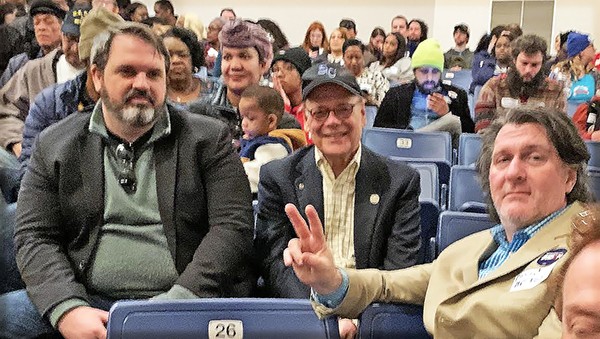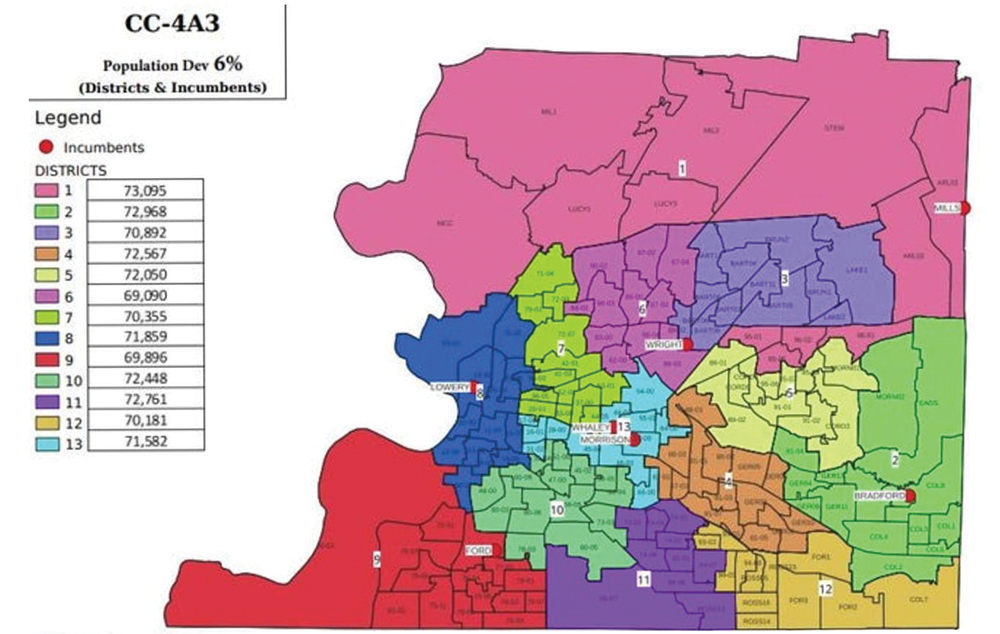The March 3rd Super Tuesday vote, with presidential preference primaries favoring Democrat Joe Biden and President Donald Trump, and nominating Joe Brown and Paul Boyd, respectively, as the Democratic and Republican candidates for General Sessions Court clerk, has come and gone.
But there was still politics to be found locally. In a lengthy, oddly contentious meeting of the Shelby County Commission on Monday, political factors weighed heavily on several controversial issues, most of which were resolved either unanimously or via one-sided votes. A pair of hot-button issues were addressed in the form of late add-on resolutions at the close of Monday’s meeting, which had already generated significant steam via the regular agenda.
One of the add-on resolutions opposed Republican Governor Bill Lee‘s proposal for open-carry legislation, at least for Shelby County, and passed the Commission by a bipartisan 10-1 vote, the lone vote in opposition coming from GOP Commissioner Mick Wright, who chose to let his dissent speak for itself.
The resolution was co-sponsored by Republican David Bradford and Democrat Tami Sawyer. The minimal discussion of the measure was itself bipartisan, with, for example, Democrat Reginald Milton and Republican Amber Mills making similar declarations of being pro-Second Amendment but citing opposition to the open-carry measure from law enforcement officials.
Specifically, the resolution’s enacting clause asks that any open-carry measure exclude Shelby County: “Now, therefore, be it resolved the Board of County Commissioners of Shelby County Tennessee be carved out of any and all permitless gun carry legislation.”
It should be noted that in a separate action over the weekend, the Shelby County Democratic Executive Committee unanimously passed its own resolution condemning Senate Bill 2671/House Bill 2817, the permitless-carry legislation, citing similar objections — noting that, for example, “the Memphis Mayor, Memphis Police Director, and the Shelby County Sheriff have already spoken out against the bill.”
Another late add-on resolution at Monday’s commission meeting was introduced by Sawyer. It would have repeated the commission’s previous stand in favor of voter-marked paper ballot machines in Shelby County and included an exhortation to the General Assembly to “support legislation for paper ballot on-demand options,” thereby tying into specific ongoing legislation to that end.
Further, and importantly, the resolution provides an alternative to holding a public referendum authorizing new voting machines, as apparently required under a newly unearthed provision of state law. It underscores the authority of the county commission itself, “as the governing body of Shelby County” to purchase new voting machines, and notes the subsequent reallocation last month by the commission of capital improvement funds as a means of doing so. The resolution would not be acted on directly but was by unanimous consent referred to the next meeting of the commission’s general government committee.
Commissioner Sawyer appended to the resolution a copy of a letter signed by five Republican legislators representing Shelby County and addressed to the three Republican members of the Shelby County Election Commission.
The letter, on the official letterhead of state Senator Brian Kelsey, carried two specific “recommendations” to the GOP SCEC members. One directly opposes voter-marked ballots, stating that “[a]llowing voters to handle and mark paper inevitably opens the election process to numerous unnecessary human errors” and that “reverting back to technology from the 1990s would be a huge mistake.”
A second “recommendation” needs to be quoted in its entirely: “Second, in order to ensure that everyone has the same opportunity to vote and to limit the financial strains on the taxpayers, we recommend seven days of early voting be conducted at all satellite voting locations in Shelby County, preceded by eight days of early voting at the Shelby County Election Commission office. Opening only one early voting location in the Agricenter, as was done in 2018, was wrong and in violation of state law. The solution we propose will fix this problem.”
Buried in this somewhat disingenuous language is the idea of cutting back the amount of time devoted to satellite early voting from two weeks to a single week.
Sawyer was pointed and defiant in the citation of the Kelsey letter, saying that its recommendations and circumlocutions alike, as well as the confinement of the communication to Republican members of the SCEC, constituted an affront to the commission and to the process of resolving the voting-machine issue in an orderly, conscientious manner.
“The letter undermines this board,” she declared, insisting that her condemnation of the letter be given maximum public exposure.
The voting-machine issue was not the only matter to invoke the possibility of cross-purposes between county and state authorities. An unexpected controversy arose over a proposal, advanced by Commissioners Milton and Van Turner at the behest of County Mayor Lee Harris, to allocate $33,799 for a Veterans Service Officer in Shelby County. Commissioner Mills, who with colleague Edmund Ford, had been to Nashville last week to discuss county-government needs with state officials, asked for a postponement of the action, insisting that she had been promised the prospect of not one, but five such officers for Shelby County via state action, and that county action on the matter could scuttle the state effort.
An argument ensued between Mills and Harris, with the mayor, backed by several members of the commission, expressing disbelief that county action on the matter would provoke a punitive reaction in Nashville. But in the end a narrow vote approved a deferral of the issue to the commission meeting of April 20th.
Modest controversy arose, too, over the commission’s action in approving a paid parental leave policy for county employees. The annual price tag of the proposal, $830,000, to be paid for by internet sales tax revenues, was objected to by Republican Commissioners Mills and Brandon Morrison, who cited a looming $85 million county deficit, and abstained from an otherwise unanimous vote of approval.
Democrats at the Ready
 Jackson Baker
Jackson Baker
Among those gathered Saturday morning at Kirby High School for preliminary party caucuses before this summer’s Democratic National Convention in Milwaukee were (l to r) Rick Maynard, U.S. Rep. Steve Cohen, and David Upton.

 Jackson Baker
Jackson Baker 
 Jackson Baker
Jackson Baker